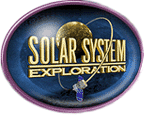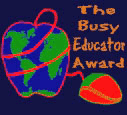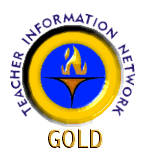Planetary Science and Resources Discoveries (PSRD) is an educational site sharing the latest research on the nature and origin of the Moon, meteorites, asteroids, planets, and other materials in our Solar System, and on identifying potential resources on those bodies that could be tapped for the benefit of people on Earth. Original support came from the Planetary Science Division of NASA's Science Mission Directorate and Hawai'i Space Grant Consortium. This site is a vital link for what's new in planetary and space sciences, space resources exploration, and learning how science works.
ENTITY |
RECOGNITION |
 |
Listed in NSDL, a digital library of exemplary resource collections and services, organized in support of science education at all levels. |
 |
Selected by Meteoritical Society as a meteoritics and planetary science education resource. |
 |
Selected by Geological Society of America, Education and Teacher Resources, as a Space Science internet resource. |
 |
Listed in DLESE, Digital Library for Earth System Education. |
 |
Our articles are reprinted as Science Features at the NASA Solar System Exploration website, Science & Technology. |
 |
Selected by the Lunar and Planetary Institute as an educational resource. |
 |
Selected by Earth and Sky as a Sky Resource Cool Site. |
 |
PSIgate (Physical Sciences Information Gateway) of the Resource Discovery Network. PSIgate provides access to high quality Internet resources for students, researchers, and practitioners in the physical sciences, specifically in: astronomy, chemistry, earth sciences, physics, and science history and policy. Each resource in the main PSIgate Catalogue has been selected by information professionals and subject specialists to ensure relevance and quality. [May 12, 2003.] |
 |
Solar System link. |
 |
Featured by Space Science Network Northwest NASA Broker/Facilitator as a Solar System exploration link. |
 |
Busy Educator's Award. [July 26, 2002.] |
 |
Selected by Science-Web-Award.com for extraordinary effort in presenting quality science information to a wide audience. [April 30, 2002.] |
  |
Selected by the National Academies Press as a Cool Science Site. Awarded to "..sites that we feel exemplify COOL -- by being interesting and important, and by presenting science-related information in imaginative, creative and compelling ways. We think you've done that." [April 1, 2002.] |
 |
Teacher Sites Gold Award. "For excellence in utilizing the Internet as an empowering tool for quality education. Go to this site for the latest discoveries in planetary science. They write and archive full-length articles on topics of interest to educators, amateur astronomers, and general readers. The articles are arranged under several broad topics including individual planets meteorites, the origin of life, and the controversy over life on Mars. All articles are based on research papers published in scientific journals by NASA sponsored scientists. Each article receives a technical review before going on-line. The articles feature graphics, bibliographic references, and internet links to primary sources and supplemental material." [April 24, 2001.] |
 |
Selected by the National Science Teachers Association for sciLINKS..an endeavor by NSTA to connect textbooks to useful online content. "Your web page was selected by our team of teachers who reviewed it using a stringent set of criteria that ensure selected materials have accurate content and effective pedagogy." [Jan. 25, 2001.] |
 |
For excellence among space-related Web sites. "Many Web sites report the latest news about planetary science. Fewer, though, do what the University of Hawaii's Planetary Science Research Discoveries (PSRD) does: take an indepth look at a particular area of the field. PSRD published an average of just one to two articles a month, but these articles usually go into considerable, useful detail.." [Jan.17, 2000.] |
 |
Astronomy Web Link. "..An educational site reporting fascinating NASA- sponsored discoveries about planets and space. Archived stories are classed under a planet, a moon, comets, etc. with a whole section dedicated to life on Mars issues." [July 6, 1999.] |
 |
Featured science site. "Recent discoveries in the field of planetary research. Contains an archive of past articles. [July, 1999.] |
 |
Research link in Scout Report for Science and Engineering. "..Interesting aspects of the site are the...Archive sections... The Website also provides a searchable (by keyword) database and links to related resources." Copyright Internet Scout Project, 1994-2000. http://scout.wisc.edu/ [Feb. 1999.] |
 |
ENC Online - Eisenhower National Clearinghouse for Mathematics and Science Education. "..Students and visitors are encouraged to learn how science works by sharing in ideas and discoveries. Based on work published in journals, this web site lists articles suited for the interdisciplinary nature of planetary science." [Oct. 1998.] |
 |
Hot Education/Public Outreach link for Solar System Exploration. |
 |
Featured in Science and Engineering: Astronomy. |
 |
Space Science Resource link. Find NASA teaching materials: connecting educators and students to NASA-relevant information, services, and materials. |
 |
The Web's Best Sites. "E-zine devoted to NASA's space science research. Contains articles about geology of the planets, meteorites, and comets. Also feature an archive of past issues and a glossary of related terms." |






















